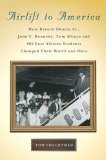Summary | Excerpt | Reviews | Beyond the Book | Readalikes | Genres & Themes | Author Bio
How Barack Obama, Sr., John F. Kennedy, Tom Mboya, and 800 East African Students Changed Their World and Ours

 Book Reviewed by:
Book Reviewed by:
Jo Perry
Buy This Book
This is a huge moment. It’s one of those times when a
movement that seemed ethereal and idealistic became a reality
and took on political substance... Obama is changing the
tone of American liberalism, and maybe American politics,
too.
Obama was being propelled to prominence and potential victory
by a tide of youthful voters who saw in him the promise of a society
whose politics would no longer turn on racial images and stereotypes.
His apparent ease with his unusual background contributed
to that perception. But he was also the embodiment of the hopes of
several generations of Americans, black and white, who had fought
for civil rights. They perceived his candidacy, and the possibility
that he might actually be elected president, as the chance to break a
barrier that they had been trying to cross for fifty years, in pursuit of
social justice and a color- blind society. Obama encapsulated the aspirations
of both groups in his oft- repeated line, “We are the ones we
have been waiting for.”
The history of Barack Obama’s rise is a version of the American
dream story, but not the one that most Americans were used to
hearing. In most previous iterations of the dream saga— rags to riches,
anonymity to glory, victim to victor— the protagonist was white and
from a Europe an background. Few who achieved the promise of the
dream had been men or women of color, and almost none had a parent
who came from Africa.
As the campaign wore on, the public was intrigued to learn, from
Obama’s now-bestselling books and from interviews with him and
capsule bios on television and on the Internet, that his father, Barack
Obama, Sr., had come to the United States in 1959, supposedly with
several dozen other East Africans, mainly from Kenya, in an “airlift.”
Some reportage called it the Kennedy airlift, for John F. Kennedy;
others the Mboya airlift, for Kenyan politician Tom Mboya; and still
others, the East African airlift. The term “airlift” was shorthand, a
reference to planes chartered to bring dozens and then hundreds of
East African students to the United States between 1959 and 1963.
As interest in Obama grew, so did curiosity about his Kenyan
roots. Some articles included the information that Obama Sr. had
been a friend of fellow Luo tribesman Mboya, the visionary who
conceived the airlifts and was able to get them airborne through the
efforts of American friends. Others cited the tale that a generation
earlier, Obama’s grandfather had been the first person in his tribal area— Alego Kogelo, the home of the Olego people, near Lake Victoria in western Kenya— to have exchanged his native garb for Western clothes.
The facts bore out much, though not all, of this story. Grandfather
Onyango Obama was a Luo of considerable personal force and
integrity. Born in 1898, he had fought in various parts of Africa in
the Great War, then returned to Kogelo to clear land for a farm
near Lake Victoria; but to earn money for his family he had also
worked as a cook in Nairobi and on safari. An herbalist, he had fought
against the confidence schemes of shamans and witch doctors. When
a first wife was unable to bear children he took a second and later a
third, who did. Despite many obstacles, he learned to read and write
some English, a rare thing among rural Africans then. Initially subjected to suspicion from the other villagers for this, he eventually
earned their respect because he was one of the few who could speak
with the Europeans in their own language. He was the first to adopt
Western ways, such as putting food on plates and eating with utensils.
Converted to Protestantism when young, he later converted
again to the Muslim religion, which accounts for the name that he
gave to his eldest son, born in 1936. He also added “Hussein” to his own name. Later, Onyango drifted away from the Muslim religion, did not raise his children in that faith, and was not known by the Hussein name. He served again with the British in Burma in World War II, and then returned home. According to his widow, Onyango
was arrested in 1949, imprisoned, and tortured by the British for supposedly
consorting with other former soldiers who were beginning
the revolt that would become known as the Mau Mau uprising.
Never convicted, upon his release he became bitterly anti-British.
Excerpted from Airlift to America by Tom Shachtman. Copyright © 2009 by Tom Shachtman. Excerpted by permission of St. Martin's Press. All rights reserved. No part of this excerpt may be reproduced or reprinted without permission in writing from the publisher.





The Flower Sisters
by Michelle Collins Anderson
From the new Fannie Flagg of the Ozarks, a richly-woven story of family, forgiveness, and reinvention.

The House on Biscayne Bay
by Chanel Cleeton
As death stalks a gothic mansion in Miami, the lives of two women intertwine as the past and present collide.

The Funeral Cryer by Wenyan Lu
Debut novelist Wenyan Lu brings us this witty yet profound story about one woman's midlife reawakening in contemporary rural China.
Your guide toexceptional books
BookBrowse seeks out and recommends the best in contemporary fiction and nonfiction—books that not only engage and entertain but also deepen our understanding of ourselves and the world around us.